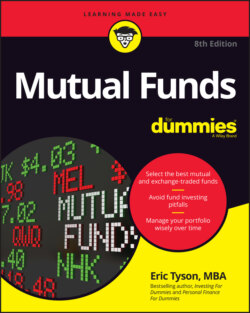Читать книгу Mutual Funds For Dummies - Eric Tyson - Страница 29
Measuring risks: Investment volatility
ОглавлениеIf you read the previous section, you know you should put all your money in stocks and real estate, right? The returns sure look great. So what’s the catch?
The greater an investment’s potential return, the greater (generally) its risk, particularly in the short term. But the main drawback to ownership investments is volatility (the size of the fluctuations in the value of an investment). Last century, for example, stocks declined by more than 10 percent in a year approximately once every five years. Drops in stock prices of more than 20 percent occurred about once every ten years (see Figure 1-1). Thus, to earn those generous long-term stock market returns of about 9 percent per year, you had to tolerate volatility and be able to hold onto the investment for a number of years to wait out sharp, short-term declines. That’s why you absolutely should not put all your money in the stock market.
In Figure 1-2, you see bonds that have had fewer years in which they’ve provided rates of return that were as tremendously negative or positive as stocks. Bonds are less volatile, but, as I discuss in the preceding section, on average you earn a lower rate of return.
© John Wiley & Sons, Inc.
FIGURE 1-1: Historic probability of different U.S. stock returns.
© John Wiley & Sons, Inc.
FIGURE 1-2: Historic probability of different U.S. bond market returns.
Some types of bonds have higher yields than others, but nothing is free, either. A bond generally pays you a higher rate of interest as compared with other bonds when it has
Lower credit quality, which compensates for the higher risk of default and the higher likelihood that you’ll lose your investment.
Longer-term maturity, which compensates for the risk that you’ll be unhappy with the bond’s interest rate if interest rates move up.
Callability, which retains an organization’s or company’s right to buy back (pay off) the issued bonds before the bonds mature.
Companies like to be able to pay off early if they’ve found a cheaper way to borrow the money. Early payback is a risk to bondholders because they may get their investment money returned to them when interest rates have dropped.
